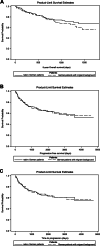No evidence to support the impact of migration background on treatment response rates and cancer survival: a retrospective matched-pair analysis in Germany
- PMID: 33971845
- PMCID: PMC8108356
- DOI: 10.1186/s12885-021-08141-8
No evidence to support the impact of migration background on treatment response rates and cancer survival: a retrospective matched-pair analysis in Germany
Abstract
Background: Immigration has taken the central stage in world politics, especially in the developed countries like Germany, where the continuous flow of immigrants has been well documented since 1960s. Strikingly, emerging data suggest that migrant patients have a poorer response to the treatment and lower survival rates in their new host country, raising concerns about health disparities. Herein, we present our investigation on the treatment response rate and cancer survival in German patients with and without an immigrant background that were treated at our comprehensive cancer center in Germany.
Methods: Initially, we considered 8162 cancer patients treated at the Center for Integrated Oncology (CIO), University Hospital Bonn, Germany (April 2002-December 2015) for matched-pair analysis. Subsequently, the German patients with a migration background and those from the native German population were manually identified and catalogued using a highly specific name-based algorithm. The clinical parameters such as demographic characteristics, tumor characteristics, defined staging criteria, and primary therapy were further adjusted. Using these stringent criteria, a total of 422 patients (n = 211, Germans with migration background; n = 211, native German population) were screened to compare for the treatment response and survival rates (i.e., 5-year overall survival, progression-free survival, and time to progression).
Results: Compared to the cohort with migration background, the cohort without migration background was slightly older (54.9 vs. 57.9 years) while having the same sex distribution (54.5% vs. 55.0% female) and longer follow-up time (36.9 vs. 42.6 months). We did not find significant differences in cancer survival (5-year overall survival, P = 0.771) and the response rates (Overall Remission Rate; McNemar's test, P = 0.346) between both collectives.
Conclusion: Contrary to prior reports, we found no significant differences in cancer survival between German patients with immigrant background and native German patients. Nevertheless, the advanced treatment protocols implemented at our comprehensive cancer center may possibly account for the low variance in outcome. To conduct similar studies with a broader perspective, we propose that certain risk factors (country-of-origin-specific infections, dietary habits, epigenetics for chronic diseases etc.) should be considered, specially in the future studies that will recruit new arrivals from the 2015 German refugee crisis.
Keywords: Cancer; Comprehensive cancer center; Germany; Matched-pair analysis; Migration background; Response rate; Socioeconomic status; Survival.
Conflict of interest statement
The authors declare that they have no competing interests.
Figures

Similar articles
-
A matched-pair analysis on survival and response rates between German and non-German cancer patients treated at a Comprehensive Cancer Center.BMC Cancer. 2019 Oct 30;19(1):1024. doi: 10.1186/s12885-019-6241-9. BMC Cancer. 2019. PMID: 31666035 Free PMC article.
-
Migration pattern and mortality of ethnic German migrants from the former Soviet Union: a cohort study in Germany.BMJ Open. 2017 Dec 19;7(12):e019213. doi: 10.1136/bmjopen-2017-019213. BMJ Open. 2017. PMID: 29259065 Free PMC article.
-
Breast cancer presentation and therapy in migrant versus native German patients: contrasting and convergent data of a retrospective monocentric study.Arch Gynecol Obstet. 2016 Jul;294(1):145-52. doi: 10.1007/s00404-015-3938-0. Epub 2015 Nov 4. Arch Gynecol Obstet. 2016. PMID: 26538355 Clinical Trial.
-
Migration and health: exploring the role of migrant status through register-based studies.Dan Med J. 2015 Apr;62(4):B5068. Dan Med J. 2015. PMID: 25872539 Review.
-
The health status of Russian-speaking immigrants in Germany.Horm Metab Res. 2007 Dec;39(12):858-61. doi: 10.1055/s-2007-993153. Horm Metab Res. 2007. PMID: 18075968 Review.
Cited by
-
Influence of Turkish origin on hematology reference intervals in the German population.Sci Rep. 2021 Oct 26;11(1):21074. doi: 10.1038/s41598-021-00566-2. Sci Rep. 2021. PMID: 34702878 Free PMC article.
-
Impact of patient nationality on the severity of early side effects after radiotherapy.J Cancer Res Clin Oncol. 2023 Aug;149(9):5573-5582. doi: 10.1007/s00432-022-04505-0. Epub 2022 Dec 10. J Cancer Res Clin Oncol. 2023. PMID: 36495329 Free PMC article.
References
-
- Federal Office for Migration and Refugees. Migration Report 2018 - Central conclusions, [Available from: https://www.bmi.bund.de/SharedDocs/downloads/DE/publikationen/themen/mig...; 2020. Accessed 7 Mar 2020.
MeSH terms
LinkOut - more resources
Full Text Sources
Other Literature Sources
Medical
Miscellaneous

